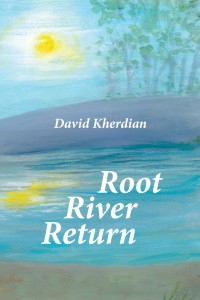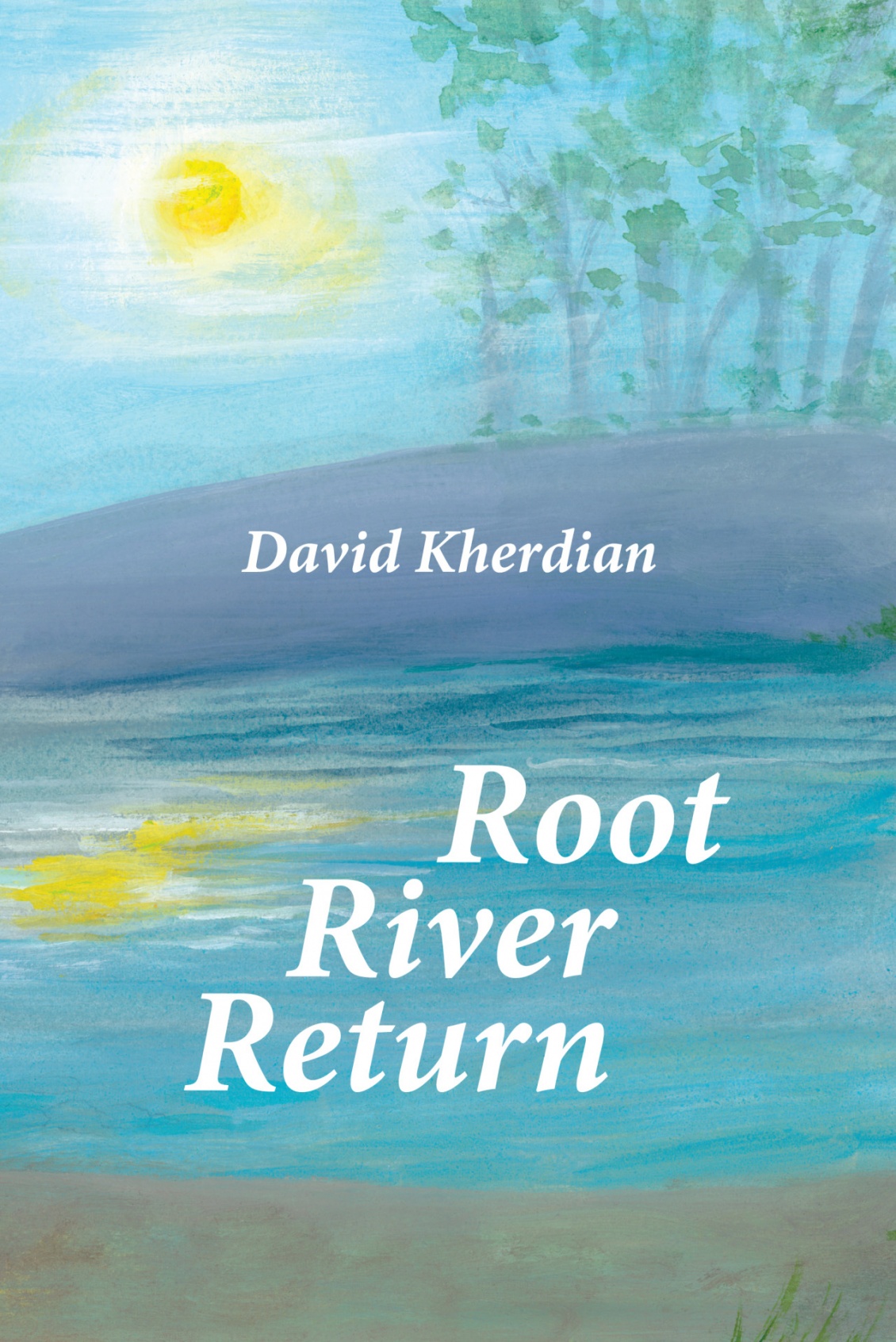Root River Return by David Kherdian / Beach Hill Publications / 2015
 In 1970, I was a refugee from Brooklyn living in a broken down old house in Lyme, New Hampshire. I came into the country for the same reason that many of my generation did, to heal the stresses of the lunatic sixties and to find a better way of life. Working as a low laborer with a local construction crew, I tried to fit in as best I could. I tried to decipher their deep New England way of talking. It seemed like another language that had developed without a thought to the world beyond.
In 1970, I was a refugee from Brooklyn living in a broken down old house in Lyme, New Hampshire. I came into the country for the same reason that many of my generation did, to heal the stresses of the lunatic sixties and to find a better way of life. Working as a low laborer with a local construction crew, I tried to fit in as best I could. I tried to decipher their deep New England way of talking. It seemed like another language that had developed without a thought to the world beyond.
My goal was to learn how to do a hard day’s work and I did, hoisting plank after plank onto the roof of the house the Kherdians had bought on the edge of the big forest at the foot of Bear Hill. We rebuilt their whole roof and in the process I understood that he was a poet. We got to know each other a bit beyond the landowner/worker relationship. It was probably obvious I was not a “local” and had my own story and reasons for being where I was, and it would be especially obvious to a perceptive and sensitive poet.
Many years passed, about forty-five, and then somehow I saw an announcement of David’s book of poems, Living in Quiet (Deerbrook Editions, 2013), and it all came back and stayed back; I can see all the scenes of long ago in perfect clarity. Or as the poet says:
Standing on the leafy bank
on my first day back
overlooking hills & ravines
and the river I fished,
I knelt, reached back over
the years, and threw a stick
that tumbled a wild green apple.
One bite and it all came back.
And so, I wrote to him from Indonesia, from Bali where we were living, and we reconnected. I sent my check and received my autographed copy of Living in Quiet.
As I do with anything that is “any good” I read every single word and sometimes more than once to capture the meaning, the essence of it all. His writing is not complicated except in the sense that there is such depth in the clarity and precision of his words. He grasps and is able to express the most important feelings, those that constantly escape the net of expression.
It takes time and quiet to think deeply, to discover how one really feels about people, situations, and the character of one’s life. Perhaps it also takes the perspective of age to look back and clearly see what we most assuredly missed when we first saw it, whether it be our hometown, our friends, or the people we saw but didn’t really see.
In his new volume, Root River Return, 2015, by Beach Hill Publications, David Kherdian continues his poetic reflections, focusing on the town of his youth, Racine, Wisconsin.
Below
The city’s smallest park
there behind the
downtown theaters
and below the street
that followed the lake
With a bench or two
a patch of grass
and a view of blue water
clear to the horizon
I had come from the busy city
to sit on the grass alone
absorbed in the life
of that place
that for the moment
was home
David Kherdian’s poetry is evocative of past time, of a simpler world, of memory one can taste, and of feelings we all share as human beings but so few of us are able to express.
Dear Mrs. McKinney
Hands down, you were my favorite
teacher at Garfield Elementary,
or at any school since:
your stern, austere face, that
held an objective judgment of
everything in charge;
the patient way you taught,
out of a deep belief and respect
for learning,
and the good books you chose
to read aloud –
in particular, Mark Twain;
and the punishment you handed
out (a twin cheek twist, just
once, with forefingers and thumbs)
embarrassed us only because
we had failed ourselves,
for we had wisely learned from you
the need for discipline and regard.
Long after I left that place
I saw you once waiting for a bus,
and though I returned your warm
smile, I hurried on.
Why didn’t I stop, as I could
see you wanted me to? I deeply
regretted it for weeks, and there
are moments when I remember it still.
And nothing, not poem, not time,
not anything for which I might
stand proud, can erase that seeming
failure of feelings and regard on
my part.
I loved you, I really did, and I
wish now that in stopping and chatting
with you for a moment I could have
shown it to you then,
instead of now, in this poem,
in which only time and loss, not
you and I, are the subject to be held.
Poems like this, short prose, and character sketches from his life follow one after another in consistent beauty. It is an experience of reliving the most important and delicate feelings of one’s life.
David Kherdian was born in 1931 in Racine, Wisconsin. He is in his eighties now and still vital, active, productive. He is an Armenian and grew up within that community.
In 1915, during the first World War, the dying Ottoman Empire took advantage of the tumult of war to systematically destroy its Armenian minority. Millions died of starvation and execution. Kherdian’s mother and father scarcely survived; they landed in the promised land of America.
Although his Armenian heritage informs Kherdian’s persona as it must, that fact does not define him. He refuses to be categorized either by that or by his association with the Beat poets. In correspondence, I learned very clearly that he always wanted to be just himself, even if he wasn’t sure what that was earlier in life. He knew he wanted to be an artist but was not sure what kind of artist he wanted to be or what that even meant. He emerged as a fine writer of many books published in fourteen different languages. It is a long list reflecting great quality but, for me, his poetry is the heart of it all.
I didn’t want to protect myself
by seeking perfection against the
accidental onslaughts of time-
but instead to move imperfectly
through it all, not to be the best
or the only, or the one to watch,
but rather to the beggar of mercy
and grace, finding new hope
in each disappointment
believing against reason
(against what the senses said could not be)
that there was an order beyond this
disorder, that there was
a truth beyond this lie,
and that I was included in its design,
that could not be seen or named
but could be believed in,
if one believed that one
was loved.
On the back cover of Root River Return a testimonial by Aria Baliozian says, “…a Kherdian poem has this in common with a Bach prelude; it is not only beautiful but an explanation of beauty.” That is an exquisite idea and I have spent a good deal of time contemplating it. It goes to the heart of what I think art is.
The attempt at art requires honesty, courage, sincerity, emotion, and energy. Nothing false survives in the realm of art which is why I think David Kherdian’s poems are so important. They reveal a truly authentic man exposing his heartfelt experience and the highly nuanced emotions that accompany that experience. The skill and artistry of finding the right words and combinations of words to express for us what we have always known and felt makes David Kherdian very special. By the magic of art his life becomes our life.
Ricker Winsor
Surabaya, Indonesia
February 11, 2016
About Ricker Winsor
Ricker Winsor studied American and Russian Literature at Brown University and Painting and Drawing at Rhode Island School of Design where he received an MFA.
His new book, The Painting of My Life, was released by Mud Flat Press and is available on Amazon. His first book, Pakuwon City, Letters from the East, is also available on Amazon. His essays and short fiction have been published at “Reflets du Temps” in France and at Empty Mirror in the USA.
Ricker is a painter and writer living in Surabaya, Indonesia. Visit him at rickerwinsor.com, on Facebook and Twitter.
